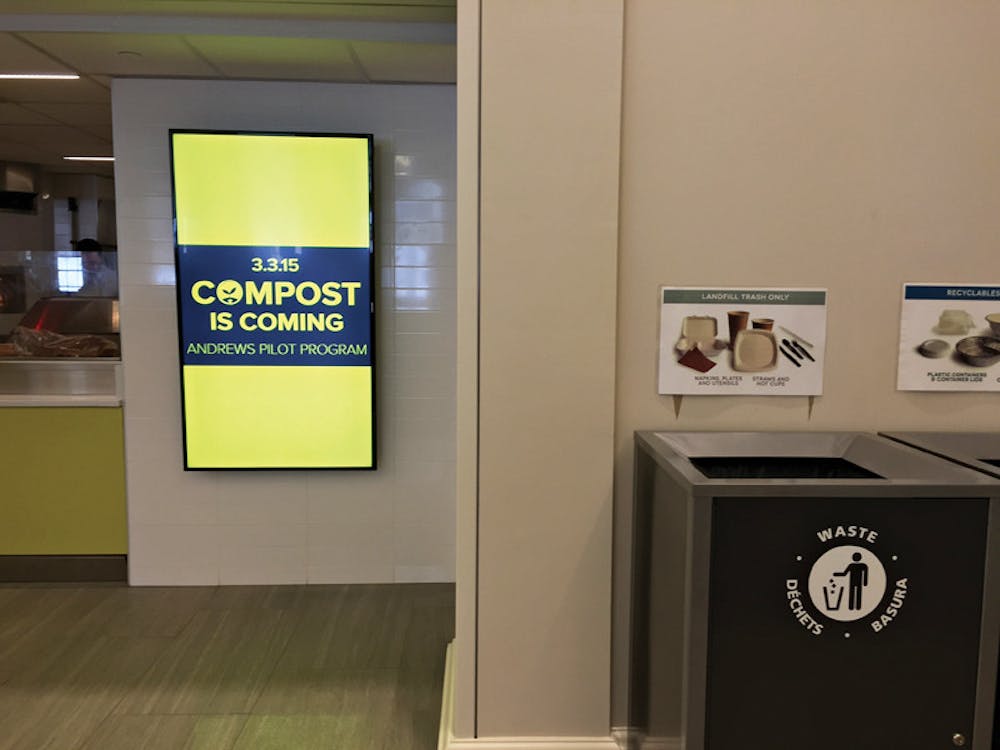The University will kickstart an 11-week composting pilot program at Andrews Commons Tuesday, prefacing a collaborative effort by the Office of Energy and Environment, Brown University Dining Services and the Department of Facilities Management to bring mandatory composting to every dining hall by January 2016.
The push for composting follows the January 2014 enactment of the Rhode Island Refuse Disposal Law, which requires institutions to compost if they generate more than two tons of organic waste per week. The requirements will take effect Jan. 1, 2016.
Additionally, the Brown Student Compost Initiative, SCRAP, submitted a report to the University last year detailing the need for a campus-wide composting program. The Sustainability Strategic Planning and Advisory Committee considered the report in its eventual plans to implement composting, said Jasmine Fuller ’15, a member of SCRAP.
The effort to implement composting “couples with our sustainability initiative,” said Jessica Berry, sustainability program manager. “There’s a lot of waste produced in terms of to-go containers and coffee cups. We’re looking at reducing those, and if we can’t reduce, then getting them out of the landfill stream.”
Under the program, items at Andrews that were once non-compostable, like utensils and cups, will be replaced by items made of compostable materials, Berry said. “It’s an added cost, but it significantly diverts a lot of waste.”
The pilot alone, which runs through May 15, will cost the University $9,000 upfront, Berry said. A third of that budget goes toward capital costs and the rest toward operations, she added.
Composting has the potential to reduce overall costs for the University, said Haily Tran ’16, a sustainability intern in the Office of Sustainable Energy and Environmental Initiatives. The Compost Plant, a local compostable materials collection company, will charge a fixed sum to pick up the University’s compost, “but it’s less than we pay Waste Management to take our trash away, since they take it based upon weight,” Tran said.
Currently, the Compost Plant only offers collection services. The company brings waste to Earth Care Farm, the only facility in Rhode Island that processes compost, said co-founder Leo Pollock. He and business partner Nat Harris are on track to set up their own composting facility by the end of this year, he said.
Once the Compost Plant can process its own compost, it will return some of the compost created from the University’s waste to Brown for free, Pollock said. This nutrient-rich product could then “go to the garden at the Urban Environmental Laboratory or to Brown facilities to use around campus,” he added.
“Compost is the broken down materials of compostable waste,” said Isabelle Aubrun ’16, sustainability intern for dining services. A “nutrient-rich supplement,” compost is a healthy alternative to synthetic fertilizer, she said.
“Brown Dining Services has wanted to (develop) its composting program for a long time, but there weren’t any local industrial composters,” wrote Robert Chase, facilities and sustainability manager, in an email to The Herald. That changed when the new state law created an expanded consumer base, incentivizing companies like the Compost Plant to expand.
In Rhode Island, as well as in other states where the bill has passed, “the policy is way ahead of the infrastructure,” Pollock said. “Even if all the hospitals, restaurants and universities wanted to divert their waste, there just aren’t the facilities,” he added.
While the University considered several dining halls as initial locations for the program, Andrews was strategically chosen for its high waste volume and open floor plan, Berry said, adding that Andrews has grappled with “overflowing bins” — a difficulty the composting program could mitigate.
The Compost Plant began working with the University a month ago through another composting pilot in the Sharpe Refectory focusing on pre-consumer waste — the waste that accumulates during preparation of food, Pollock said.
But compared to the Ratty, “Andrews is much more challenging because that’s a dining facility that was built with no dishwasher, so up until now it’s been all disposable, some recyclable product,” Pollock said.
A coalition of student volunteers will stand by the new composting bins during all dining hours for the first two weeks of the program in order to help diners at Andrews sort their waste, Aubrun said. “Part of the idea with the pilot is to condition people who eat in the dining halls to know what is organic and what is non-organic and start building in those behavioral habits,” Aubrun added.
Sorting correctly will be essential to an effective composting process.
“If there’s contamination mixed anywhere in the entire bag, it ruins the whole load,” Pollock said, adding, “We want a clean waste stream: organics with no plastics, metals, or glasses.”
According to the 2014 Sustainability Report by the Office of Sustainable Energy and Environmental Initiatives and Facilities Management, 43 percent of Brown’s current waste stream is incinerated and only 37 percent is diverted, meaning the waste is reused, recycled or composted instead of sent to a landfill.
With the new institutional composting program, up to 47 percent of the University’s waste could be diverted, with campus-wide composting accounting for 20 percent of these diversions, the report said.
“If we can complete the cycle instead of sending waste to the incinerator, which only releases more carbon dioxide, then composting has a net positive effect,” Tran said.
“SCRAP has always seen composting as the natural next step for Brown,” Fuller said.
“It’s a shame that Brown hasn’t caught up to its peer institutions,” she said, adding that all Ivy League schools except Princeton and Brown have already adopted composting programs.
A previous version of this article misstated that the Rhode Island Refuse Disposal Law was enacted in July 2014. In fact, it was enacted in January 2014. A previous version of this article also misstated that the composting pilot will save the University money long-term. In fact, the long-term financial impact of the pilot is unknown. The Herald regrets the errors.





